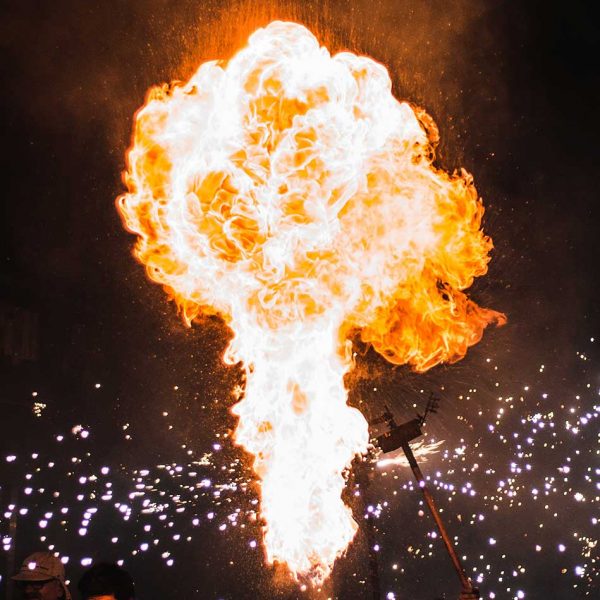Like earth, air, and water, fire is a key element in our lives: a life-giving friend that keeps us warm and helps us to prepare food. Control of fire is a constant in the history of mankind and also plays a part in numerous festive and ritual celebrations, both secular and religious.
Fire is often used in rituals due to its hypnotic power. It accompanies us at all stages of our lives, and it helps us to form communities with others. Numerous kinds of intangible heritage around the world–devils, dragons, torches, bonfires, and firebrands–are based on fire, which always prompts a mixture of worship, fear and awe.
Fire, both friend and enemy
Fire is a life-giving friend that keeps us warm and helps us to prepare food. Gaining control over fire was a turning point in our physical and cultural evolution as it enabled us to cook food, be more active during the night, and protect ourselves from predators. But it can also be an enemy, a potentially destructive element that that can burn down forests and houses, so it needs to be controlled.
A fire in every home
Fire is so important that population censuses used to be based on the number of fires. For many centuries, hearths were used for counting the population to collect taxes: one hearth represented one house, one family, one part of the territory, and therefore one tax-paying unit. In Estonia, hearth taxes date back to 1295; in Catalonia, they were imposed by the Catalan Cortes in 1368.
The cult of fire
Veneration, fear of fire, and the desire to control it has been a part of religious worship since prehistoric times. Fire worship is a feature of almost all societies throughout history, and the symbolism of fire is present in numerous religious rituals. In Christianity, for example, it plays a role in the celebration of Easter.
In agricultural societies, such as those in the Pyrenees, sun worship is seen in the two solstices: the summer solstice in June, when there are most hours of sunshine and crops are harvested; and the winter solstice, in December, when the day begins to lengthen, marking the beginning of a new cycle. The passage of the seasons is ritualized in symbolic worship of fire and the sun. This explains why both the sun and fire play a role on the two solstices, which in our culture coincide with St. John’s Eve and Christmas Eve.
Prometheus, the god of fire
The Greek myth that describes the origin of fire is the myth of Prometheus, whose name means “fore-seer” in Greek.
According to the myth, Prometheus, who enjoyed angering Zeus, created human beings from clay soaked with his tears. Prometheus, himself angry with Zeus, decided to steal some of the sacred Olympian fire and give it to mankind. This is why this virtual museum is named after the Greek god.
Prometheus giving fire to humans (1817), Heinrich Füger. Work in the public domain.
 Occitan
Occitan












